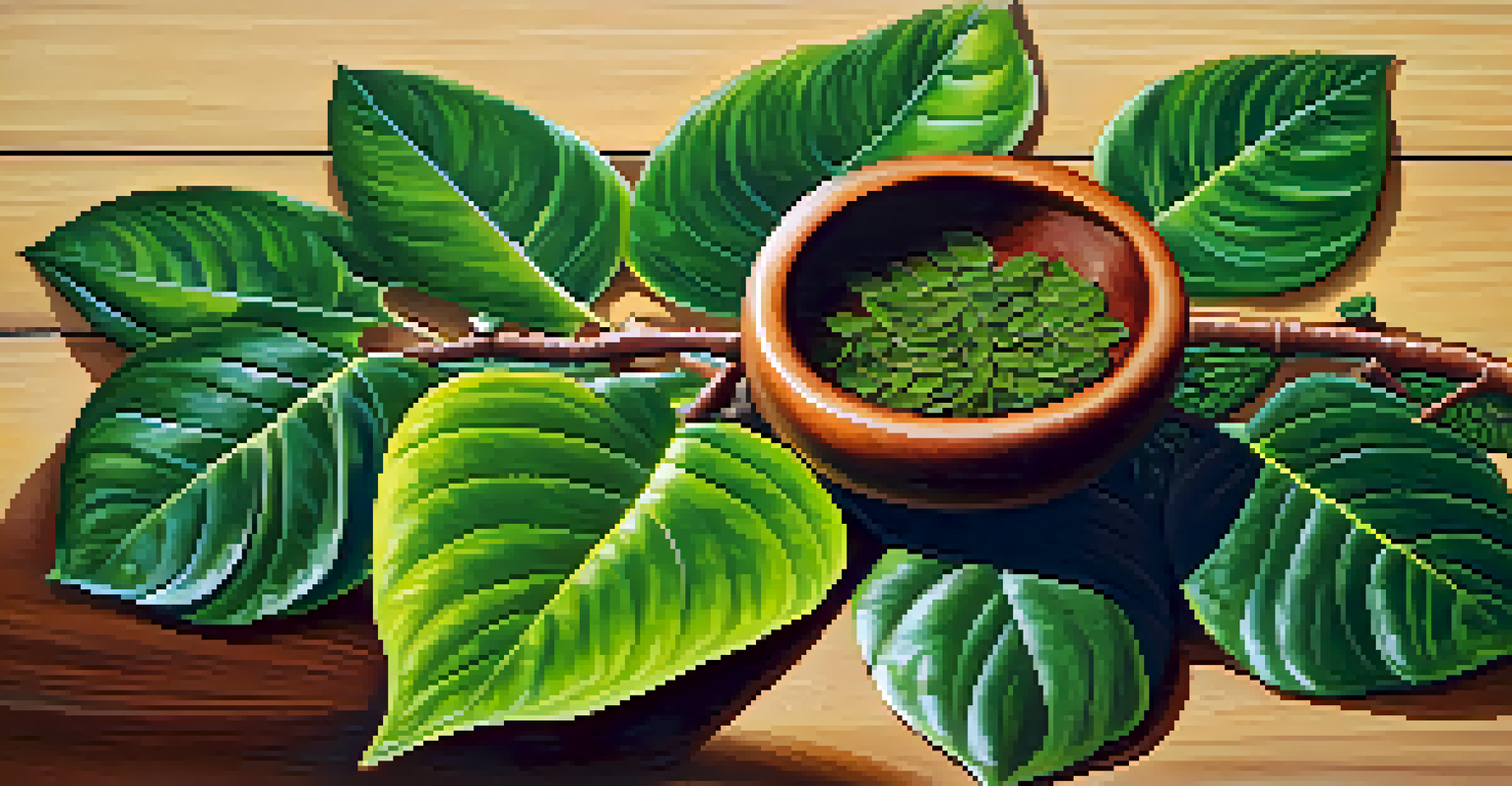The Role of Ayahuasca in Indigenous Medicine and Healing

What is Ayahuasca and Its Origins in Indigenous Culture?
Ayahuasca is a powerful plant-based brew traditionally used by Indigenous peoples in the Amazon rainforest. Its origins trace back centuries, as it has been a cornerstone for spiritual and medicinal practices among various tribes. The brew is typically made from the Banisteriopsis caapi vine and the Psychotria viridis leaf, combining their properties to induce altered states of consciousness.
Ayahuasca is a powerful catalyst for personal growth and healing, providing insights that can transform lives.
Indigenous shamans have long regarded Ayahuasca as a sacred tool for healing and connecting with the spiritual world. The experience can lead to profound insights, allowing individuals to confront personal and communal challenges. This connection to nature and spirituality is central to the role of Ayahuasca in Indigenous medicine.
Moreover, Ayahuasca ceremonies are not just about consuming the brew; they involve a deep cultural context, including chants, rituals, and communal support. This collective aspect reinforces the bonds within communities, fostering healing on both individual and societal levels.
The Healing Properties of Ayahuasca in Traditional Practices
Ayahuasca is often employed in treatment for various physical and psychological ailments, including depression and addiction. Indigenous healers believe that the brew can help cleanse the body and spirit, facilitating emotional release and personal growth. This holistic approach contrasts with conventional medicine, which often focuses solely on physical symptoms.

Research supports some of these claims, revealing that the active compounds in Ayahuasca may promote neurogenesis and emotional resilience. This means that beyond the spiritual journey, there are tangible benefits for mental health as well. Participants often report feelings of clarity and renewal after their experiences.
Ayahuasca's Cultural Roots
Ayahuasca is a sacred brew used by Indigenous peoples for spiritual healing and community bonding.
Additionally, the communal aspect of Ayahuasca healing reinforces support networks among participants. This sense of belonging can be especially significant in addressing issues like trauma and grief, making the healing process a shared endeavor rather than an isolated struggle.
Ayahuasca Ceremonies: Structure and Significance
Ayahuasca ceremonies are meticulously organized events that usually take place at night, guided by an experienced shaman. The setting is often serene, designed to encourage introspection and connection with nature. Participants gather in a circle, creating a safe space for emotional and spiritual exploration.
The true essence of Ayahuasca lies in its ability to connect us to our humanity and the world around us.
The ceremony typically begins with the shaman invoking spirits through traditional songs known as icaros. These songs are believed to guide the participants through their journeys, providing comfort and insight along the way. The shaman's role is crucial, as they help navigate the experience and facilitate healing.
As participants consume the brew, they may experience a range of sensations and visions. This can lead to cathartic releases, including tears, laughter, or even physical purging. Such experiences are viewed as essential for personal transformation, marking a journey towards healing and self-discovery.
Cultural Significance of Ayahuasca in Indigenous Communities
For Indigenous communities, Ayahuasca is more than just a medicinal tool; it is a vital part of their cultural identity and heritage. The knowledge surrounding its use has been passed down through generations, intertwining with their cosmology and worldview. This deep-rooted significance fosters a sense of pride and continuity among community members.
Ayahuasca also plays a role in rites of passage, helping individuals transition through various life stages. Ceremonies may mark significant events, such as coming of age or healing after loss, reinforcing social bonds and cultural narratives. The brew thus acts as a bridge connecting generations and preserving traditional wisdom.
Holistic Healing Benefits
The brew is believed to promote emotional and mental health, aiding in recovery from depression and addiction.
However, the growing interest in Ayahuasca outside Indigenous contexts raises concerns about cultural appropriation. It's crucial to respect these traditions and understand their origins, ensuring that the practices are honored and not commodified.
Modern Perspectives: Ayahuasca's Rise in Popular Culture
In recent years, Ayahuasca has gained popularity beyond Indigenous communities, attracting individuals seeking alternative healing and spiritual experiences. This modern fascination has led to a rise in 'Ayahuasca tourism,' where people travel to the Amazon to participate in ceremonies. This trend reflects a growing interest in holistic health and spirituality in contemporary society.
While many participants report positive transformations, the surge in popularity raises ethical questions about the commercialization of sacred practices. It's essential to approach Ayahuasca with respect and awareness, understanding its cultural roots and the potential impact on Indigenous communities.
In response to this interest, some Indigenous groups are working to reclaim their traditions, offering authentic experiences and sharing their knowledge. This balance between sharing their culture and protecting it is vital for the sustainability of Ayahuasca practices in a changing world.
Scientific Research: Unveiling the Mysteries of Ayahuasca
As interest in Ayahuasca grows, so does scientific research into its effects and potential benefits. Studies have explored its impact on mental health, addiction, and even creativity, shedding light on the biochemical mechanisms at play. The findings suggest that Ayahuasca can promote neuroplasticity, allowing for new ways of thinking and healing.
Moreover, researchers are investigating its therapeutic potential for various psychological disorders, including PTSD and anxiety. Early results are promising, with participants reporting significant improvements following Ayahuasca experiences. However, more comprehensive studies are needed to fully understand the long-term effects and safety of its use.
Ethical Engagement with Ayahuasca
Respecting Indigenous traditions is crucial to prevent cultural appropriation and ensure authentic practices.
By bridging traditional knowledge with modern science, we can gain a deeper understanding of Ayahuasca's role in healing. This collaboration may also help to validate Indigenous practices, offering broader recognition of holistic approaches in mental health treatment.
Ethical Considerations: Respecting Indigenous Traditions
With the rise of Ayahuasca tourism and interest from non-Indigenous individuals, ethical considerations have emerged regarding the use of this sacred brew. It's essential to approach Ayahuasca with respect, recognizing its cultural significance and the wisdom of the Indigenous peoples who have used it for generations. This means understanding the ceremonies and their context rather than treating them as mere experiences.
Cultural appropriation is a significant concern, as it can lead to the commodification of Indigenous traditions. Non-Indigenous participants should seek to learn from and support Indigenous practices rather than exploiting them for personal gain. This respectful engagement helps preserve the integrity of these traditions and honors their origins.

Ultimately, fostering an environment of mutual respect and understanding can lead to a more ethical approach to Ayahuasca. By valuing Indigenous perspectives and supporting their rights, we can ensure that Ayahuasca remains a tool for healing and connection, rooted firmly in its cultural heritage.